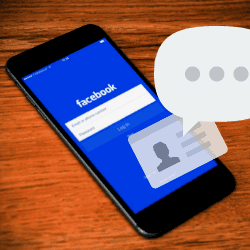Facebook, is by far the most popular social media platform used worldwide. In fact, did you know that over 1.5 billion people use Facebook annually to stay in touch and connected with their friends and family? Although Facebook can offer much more – connections with businesses, a way to network, a news outlet – at its core, Facebook is a great way to stay connected in an interactive, media-driven way, with those you love the most. In fact, the ‘sharing’ of posts and photo-driven nature of the social platform are what make Facebook such a praised avenue for staying connected.
Did you know that seniors are five times more likely to use Facebook than any other social media platform? Facebook doesn’t have to be complicated, and with a few tips, it can be quite user friendly. Since Facebook is all about connecting with others, we will start there in this Essential Facebook Guide, and by the end of this article you’ll be ready to use Facebook to stay close and connected with those people you care about most.
Building Your Profile
The first step is to build your profile. Remember, you can share as much or as little as you choose. On your profile you will upload a photo of yourself and fill in a form that tells your friends a little bit about yourself; your hobbies, your career, your birthday for example. Remember, you don’t have to fill in all of this information and you can make it all as private or as public as you would like. Don’t feel that you have to give away information that you don’t want to share.
Some people are uncomfortable sharing a photo of themselves online. Since your profile picture will be public, consider posting a picture of a landscape from your most recent vacation or an image of your pet cat or dog if you do not want to publicly share a photo of yourself. Besides the cover photo, which you do not have to include, any additional photos you share can be private and you will be able to decide exactly who can view them.
Understanding Friend Requests
Friend requests are when someone on Facebook sends you a request to be your friend. This means they are asking for access to view your profile, to follow and view your posts, and to stay connected with you. You are able to accept or refuse any friend request that comes your way.
You may additionally block individuals who you want to keep from viewing you or your profile at all. If someone is blocked they will not even be able to find you on Facebook; it will be as if you do not have an account.
SAFETY: Never, ever accept a friend request from someone you don’t know. People you don’t know may be:
- scammers looking to access your information
- digital marketers collect likes to promote products
- weirdos who just want all the friends they can get
None of these are good. Also, be careful about sending out requests (especially to famous people). Most public figures and celebrities will have “public figure” pages you can “follow” rather than “friend.” However, many lesser-known celebrities will actually accept friend requests from fans, and they can be a lot of fun.
Posting and Sharing Information
On Facebook you can post a photo or text to your page. This is information that you would like to share with your friends. For example, posting a photo album is a great way to share that amazing vacation you just took! You can upload all your photos directly to Facebook and even add captions and descriptions for all the pictures, kind of like a scrapbook, but online. You can put posts on Facebook too and these are called status updates.
Here you can write about anything of interest to you: a thought, where you are heading for lunch, an update about some exciting news. You can also post photos here by clicking the photo icon on the status update menu. Additionally, you can share information to your Facebook page. This may be an interesting article you’ve read, a funny meme your friend shared, or an event you plan to attend. To share an item you will want to click on the share arrow underneath the item you plan to share.
SAFETY: One of the most popular “phishing” scams today (when scammers get you to share your information unintentionally) is the ubiquitous “Who remembers” or “Remember when” posts. These are the memes that show pictures of an antique item like a toy, clothes, or machine and ask people to like and share if they remember what it is. These scams target older people with nostalgia, and though they seem like harmless fun, they may be phishing for information.
Other dangers are emotionally-manipulative stories and too-good-to-be-true offers. It’s been said before, but we’ll say it again: Bill Gates is not giving away half his fortune to people who share a picture of him, no hospital decides who gets a transplant based on “likes,” and you’re not going to win a free iPad by sharing and tagging ten friends. Those are scams. All you’re going to get is a strange charge from Slovenia on your credit card in 6 or 9 months.
Lastly: if you click on a post and it takes you to a Facebook sign-in page, DON’T SIGN IN. It’s almost certainly a scam.
Finding Old Friends

One of the most rewarding aspects of Facebook, besides staying in touch with your loved ones, is finding and reconnecting with old friends. There are two very simple ways to search for a friend that you once knew but have lost touch with:
1 – You can search by name.
In the search bar at the top of your Facebook page you may type in anyone’s name and a list of people with those names will appear. From here you can browse until you find the person you are looking for.
2 – You can browse a mutual friend’s ‘friend list’.
If you cannot find your friend by searching their name, consider visiting a mutual friend’s Facebook page. On your mutual friend’s page you can usually see who their friends list includes. You can browse anyone’s friends list as long as they keep it public or semi-public. Oftentimes Facebook users find connections this way.
If you happen to be connected with a friend via email or personally you can also simply ask them for their Facebook profile link. They can email or text this to you and from there, by clicking on the link, you can connect.
How to Recognize Spam, Ads, and False Information
Not everything you read on Facebook will be true. Particularly, memes, though entertaining, are not considered a reliable source of information or news. In other words, don’t get your news from a meme.
If you do plan to gather your news or information from Facebook, go to reliable sources by visiting the pages of the news source. For example, if you usually gather your news from NPR, like their page and their articles will show up in your newsfeed, or you can visit their page and scroll through the article posts.
Additionally, Facebook is littered with ads. Remember that Facebook is for gathering information too. Businesses love to gather your information from Facebook so they can sell you something. For example, if you love sailing and mention this on Facebook through photos, posts or hobbies on your about you section, you may start to see ads for boat sales and sailing excursions. Though they can be annoying at times, they are generally harmless. Don’t click on them unless you are actually interested in buying what’s for sale.
SAFETY: When you see a story on Facebook that seems too crazy to be true, it almost certainly is. Facebook has been cracking down on fake news in recent months, but not all that aggressively. On Facebook, it all looks the same: satire sites that make up silly stories for entertainment, conspiracy theory sites that link public figures and companies to outrageous wrongdoing, and undercover marketing that creates a need or danger that only their product can solve and disguises it as a news story – it takes discretion to tell what’s what.
Factcheck.org, Snopes.com, Politifact, and other sites are dedicated to dispelling rumors and countering hysteria with facts. Check before you share, or go ahead and embarrass yourself.
At the end of the day, Facebook is a great way to stay in touch with friends, stay up to date with pop culture, even follow your favorite news sources. Many seniors enjoy the one-shop-stop nature of the social media platform and its user-friendly interface. They additionally appreciate the privacy measure that Facebook employs to keep their profiles and photos private. And of course, it’s a great way to stay connected to your family and special life-long friends!

